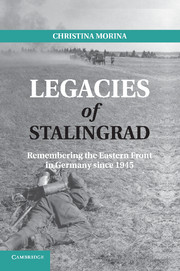Prologue
The Eastern Front War in Nazi Propaganda
Published online by Cambridge University Press: 07 October 2011
Summary
German soldiers! The fate of Europe, the future of the German Reich, the existence of our people, now lay in your hand alone.
Adolf Hitler, June 22, 1941“As of midnight the weapons are silent on all fronts. On the order of Grand Admiral [Dönitz], the Wehrmacht has stopped the fighting, which had become hopeless. Thus ends the honorable struggle that lasted nearly six years.” With these words the last entry in the War Diary of the Wehrmacht High Command (OKW) reported the final capitulation of the German army on May 9, 1945. In their final statement, the Wehrmacht leadership insisted on the honor of the German soldier and the righteousness of the Nazi war unleashed against Europe and the world. It hailed the “unforgotten achievements of the German soldiers” as acts of bravery, which would find acknowledgment in the “later verdict of history.” The OKW report closed with the prediction that eventually even the enemy would acknowledge the “achievements and sacrifices” of the German soldiers. Therefore, “every soldier can lay down his weapons in an upright and proud manner and begin to work bravely and optimistically for the eternal existence of our people in this darkest hour of our history.”
This curious mixture of admitting defeat and professing confidence in the present and future on the last day of the war encapsulated the legacy of the Nazi propaganda war. The National Socialist master narrative had depicted World War II as a historic struggle of the German “Volk” against “Jewish Bolshevism,” the war on the Eastern Front as its decisive battlefield, and the Battle of Stalingrad as its tragic-heroic climax. The OKW’s war diary entry also outlined the two basic parameters that delineated the efforts of the political elites after World War II in making sense of Germany’s recent, utterly catastrophic history – total defeat, material destruction, and massive suffering on the one hand, and reconstruction, reconciliation, and national revival on the other.
- Type
- Chapter
- Information
- Legacies of StalingradRemembering the Eastern Front in Germany since 1945, pp. 18 - 24Publisher: Cambridge University PressPrint publication year: 2011

